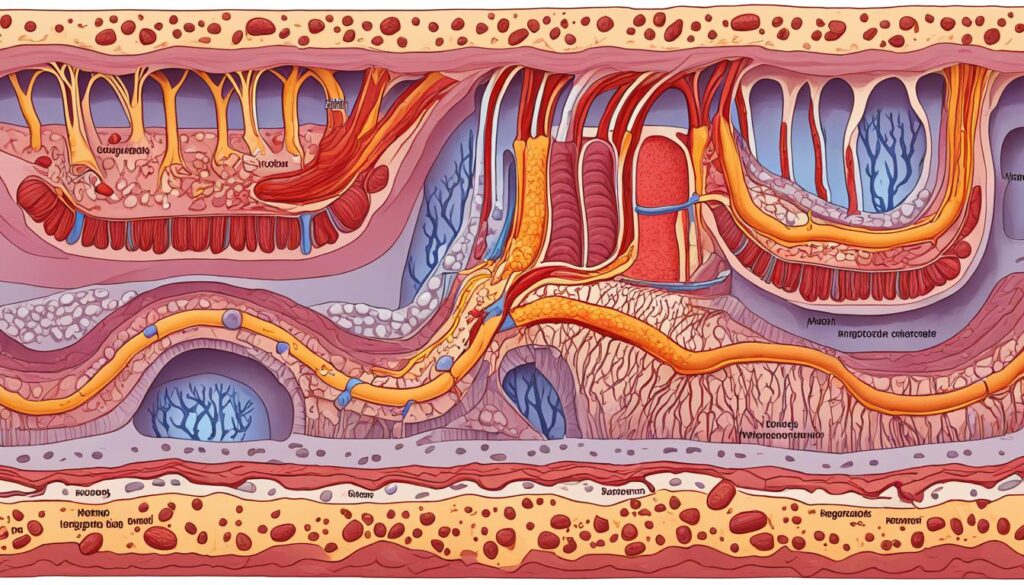Mesenteric ischemia is a condition where your intestines don’t get enough blood. This happens in chronic mesenteric ischemia (CMI). It causes vague abdominal pain which can be hard to diagnose. Atherosclerosis, the narrowing of arteries, brings about this reduced blood flow.
Table of Contents
TogglePeople with CMI feel abdominal pain after eating and may stop eating due to fear. Doctors use imaging tests to diagnose this issue. CT angiography and angiography help see the narrowed arteries.
Thankfully, there are ways to treat CMI. Treatment includes a conservative approach, minimally invasive endovascular revascularization, or open surgeries. It’s important to treat CMI fast to avoid serious risks. With quick and proper care, patients have better life chances.
What is Chronic Mesenteric Ischemia?
The mesenteric circulation includes the celiac artery, SMA, and IMA that feed the intestines with blood. When these arteries get narrower due to atherosclerosis, it’s called chronic mesenteric ischemia (CMI). This narrowing results in less blood flowing to the intestines, causing ischemia.
Overview of Mesenteric Arterial Circulation
These vessels bring oxygenated blood to the gut. A problem in this system can cause mesenteric ischemia. In this condition, the intestines lack enough blood supply.
Definition and Types of Mesenteric Ischemia
Acute mesenteric ischemia happens suddenly and needs emergency care. Chronic mesenteric ischemia, on the other hand, is slow to develop. We’ll focus on chronic mesenteric ischemia in this article, a condition that can become very serious over time.

Symptoms of Chronic Mesenteric Ischemia
If you’re fighting chronic mesenteric ischemia (CMI), life can become tough. You might feel severe stomach pain known as “intestinal angina.” This pain often comes just after you eat and can last up to 4 hours.
Postprandial Abdominal Pain
The pain happens because your intestines don’t get enough blood. This is due to the mesenteric arteries narrowing from atherosclerosis. Many people with CMI get scared to eat, which can cause them to lose a lot of weight.
Weight Loss and Fear of Eating
Eating less because of the pain can lead to malnutrition and weight loss. This cycle is hard and affects your health a lot.
Additional Symptoms
Aside from pain and weight loss, you might also feel sick or have stomach issues. These problems make coping even harder.
Most CMI patients have had other signs of artery disease, like heart issues or stroke. Recognizing these and getting treatment is key to getting better from CMI.

Causes and Risk Factors
The main cause of chronic mesenteric ischemia (CMI) is a disease called atherosclerosis. This disease makes a waxy substance, called plaque, build up in the mesenteric arteries. Usually, this happens where the arteries start. Less blood can flow to the intestines, especially when we need it most, like after a meal.
Atherosclerosis and Plaque Buildup
Chronic mesenteric ischemia happens because of plaque buildup in the mesenteric arteries. This condition makes less blood flow to the intestines. If not treated, it can cause serious problems.
Risk Factors for Chronic Mesenteric Ischemia
Certain things make chronic mesenteric ischemia more likely. These include diabetes, high blood pressure, smoking, and high cholesterol. Other, less common reasons are vasculitis, fibromuscular dysplasia, and damage from radiation. People who smoke and have conditions like high blood pressure, diabetes, and high cholesterol have a higher risk.

Diagnosis of Chronic Mesenteric Ischemia
Accurate diagnosis of chronic mesenteric ischemia (CMI) is vital. If not treated, it can cause serious health problems. The main diagnosis method involves checking the mesenteric arteries for blockages with special scans.
CT Angiography
CT angiography (CTA) is often the first step for diagnosis. This method uses detailed scans to show if there are blockages in the arteries. It also looks at other possible issues in the belly that might be causing problems. Based on this information, doctors can craft the best treatment plan.
Duplex Ultrasonography
Duplex ultrasonography is another tool, especially for early checks. It measures the speed of blood flow in the arteries. High speeds can indicate serious blockages.
This test can find a big problem where blood is not flowing well. Not as invasive as others, it’s good for first looks.
Angiography
When the initial scans don’t give a clear picture, doctors might use arterial digital subtraction angiography (DSA). This test is more direct and is very good at showing if there’s a blockage.
DSA also helps in choosing the best way to open the blocked arteries. This could be done by inserting a stent or through surgery.
Treatment Options for Chronic Mesenteric Ischemia
Managing chronic mesenteric ischemia (CMI) needs different methods. For those without symptoms, it’s about changing lifestyles. This means stopping smoking and using antiplatelet medicine. But, symptomatic CMI needs revascularization. This fixes blood flow to reduce severe stomach pain and weight loss.
Endovascular Revascularization
Endovascular revascularization is the top choice for many with CMI. It’s a less invasive method. Doctors use a balloon and stent to fix narrowed arteries. This way is safer than open surgery. It helps most patients without as many risks.
Open Surgical Revascularization
Sometimes, endovascular surgery is not possible. Then, open surgery might be needed. Doctors can do bypasses to improve blood flow. This surgery is riskier but often relieves symptoms well.
The best way to fix CMI depends on the patient’s situation. It’s a delicate balance that needs the whole healthcare team’s help. Radiologists, gastroenterologists, and vascular surgeons must work together. They choose the best treatment for each person.

Complications of Chronic Mesenteric Ischemia
If chronic mesenteric ischemia (CMI) isn’t treated, it can have serious consequences. It might even be life-threatening. Patients with CMI risk a high mortality rate within five years. Even those without symptoms have a 40% chance of dying. This is often due to heart attacks or other heart problems.
Some of the most serious complications of chronic mesenteric ischemia include:
- Intestinal ischemia and necrosis: This occurs when there’s less blood flow to the intestines. It can lead to bleeding, tears, and infection in the gut.
- Malabsorption and malnutrition: People might be scared to eat because of the pain, leading to not getting enough nutrients. This can cause malnutrition and other health problems.
- Repeated hospital admissions: The pain and other symptoms can keep coming back. This means having to go to the hospital often. It really affects how people live.
Those with chronic mesenteric ischemia also face a higher risk of heart problems. This is because of the same condition that’s causing their gut issues. Monitoring and treating CMI quickly is crucial to avoid these severe complications.

Getting a quick and correct diagnosis is very important. This can lead to effective treatment through various means. By treating the root issue early, healthcare workers can help prevent dangerous complications. This also improves how patients feel and live.
Prognosis and Quality of Life
The outlook for people with untreated symptomatic chronic mesenteric ischemia (CMI) is very grim. The chance of survival after five years is almost zero. Life isn’t much better with treatment because symptoms often come back.
This can make daily life really tough. Sufferers worry about stomach pain after eating and often lose weight. This leads to malnutrition and more health problems.
Good care from doctors is key to making life better for CMI patients. Both open and endovascular surgeries can help. Endovascular surgery is becoming more common because it’s less invasive.
After open surgery, quality of life often improves. Research shows a big impact on daily life and well-being for those with chronic mesenteric ischemia. This means gastrointestinal symptoms can really affect how people live.
But, there’s hope for those with CMI when it’s found and treated early. This can be through non-invasive, surgery, or medications. Doctors focus on the disease and its effects, hoping to improve life quality.
Chronic Mesenteric Ischemia in Elderly Patients
Chronic mesenteric ischemia (CMI) is often seen more in the elderly. This is because the likelihood of getting atherosclerosis goes up with age. Very important is that these elderly patients might show symptoms not as clearly. This makes it hard to diagnose CMI. Also, the risks during surgery, if it’s needed, are higher for older adults.
About 10% of people over 65 have mesenteric artery stenosis. This condition is rare and commonly found in those over 60. It’s seen more in women by three times. It’s crucial to evaluate each patient carefully and plan their treatment based on their specific needs.
Older people with CMI may not feel any symptoms until it affects more of their mesenteric vessels. Symptoms can include stomach pain after eating, not wanting to eat, feeling sick, throwing up, or having diarrhea. These kinds of symptoms can make it really hard to spot CMI in older people.
Also, older patients with CMI face more risks if they need surgery. A type of surgery to help, called open revascularization, can lead to heart issues because of severe atherosclerosis. Doctors often choose a less risky method first, like angioplasty and stents, to treat these patients.
It’s very important to carefully assess and plan the treatment for older adults with CMI. This helps in getting the best results and keeping the patient’s life quality as high as possible.
Lifestyle Changes and Prevention Strategies
Making lifestyle changes can prevent chronic mesenteric ischemia and slow its progression. Addressing risk factors is key. This improves heart health and lessens the impact of the disease.
Smoking Cessation
Stopping smoking is crucial. It helps prevent atherosclerosis from worsening. Quitting slows the buildup of plaque in the arteries. This improves vascular health and decreases the risk of blocked blood flow to the intestines.
Dietary Modifications
Changing your diet is important for heart health. Cut down on saturated fats. Eat more fruits, veggies, and whole grains to lower cholesterol and improve artery function.
A balanced diet with lean proteins and good fats can also prevent mesenteric ischemia.
Exercise and Weight Management
Staying active and at a healthy weight lowers the risk. Exercising helps with cholesterol, blood pressure, and blood flow. It also reduces stress, guarding against this disease.
This lifestyle, combined with the right diet, fights off risk factors like diabetes and high blood pressure.
To prevent chronic mesenteric ischemia, these changes are key. Talk to a doctor for a plan tailored to you.
chronic mesenteric ischemia
Chronic mesenteric ischemia (CMI) happens when the mesenteric arteries narrow due to atherosclerosis. This causes a reduction in blood flow to the intestines. People with CMI often feel pain after eating, lose weight, and become scared to eat. Doctors use CT angiography and angiography to diagnose it. Treatment may include managing symptoms, procedures to increase blood flow, or surgery. It’s crucial to address CMI early because it can be deadly if left untreated.
CMI occurs when the intestines don’t receive enough blood because of narrowed arteries. Symptoms include stomach pain, losing weight, and avoiding food. Early detection with advanced imaging is vital. The right treatment, whether it’s easing symptoms or restoring normal blood flow, is key. This helps prevent severe complications from this vascular disease.
Interprofessional Team Approach
Chronic mesenteric ischemia (CMI) is a tough condition needing teamwork for the best results. Professionals work together to manage CMI well. They all have important roles in looking after these patients.
Role of Radiologists
Radiologists help a lot in diagnosing CMI. They use special tests like CT angiography to see blockages in the gut’s blood vessels. Knowing how to read these tests helps make the CMI diagnosis and plan the right treatment.
Role of Gastroenterologists
Gastroenterologists are key at first when CMI is suspected. They make sure the patient’s symptoms aren’t from other gut problems. They work with the team to take care of the patient, organizing tests like endoscopies if they’re needed.
Role of Vascular Surgeons
Vascular surgeons are vital too. They do the surgeries to open up blocked blood vessels in the gut. Sometimes they use tiny balloons, sometimes they do bigger surgeries. Their skills are needed to help patients heal well and avoid problems.
Many health professionals come together for patients with CMI. This includes radiologists, gastroenterologists, vascular surgeons, and more. Their teamwork is crucial for quick and effective care. It makes a big difference in how well patients do.
Research and Future Directions
Ongoing research aims to better understand chronic mesenteric ischemia’s causes. Scientists are using advanced imaging like dual-energy CT angiography for precise diagnosis. They’re also looking for new ways to spot the disease early and improve treatment.
New treatments, including drug-eluting stents and atherectomy devices, offer hope. These methods aim to last longer and reduce follow-up surgeries. More progress in this area could really change things for those with chronic mesenteric ischemia.
Conclusion
Chronic mesenteric ischemia (CMI) is a severe condition needing quick diagnosis and right treatment. It’s caused by arteries in the stomach area getting narrow due to plaque build-up. This can badly affect your daily life, causing pain after meals, weight loss, and making you scared to eat.
It’s key to find CMI early through tests like CT angiography. A team of doctors, including radiologists and vascular surgeons, should work together to treat it. Endovascular methods, like putting a stent in, are now preferred over traditional surgery. They work well and have fewer risks.
Scientists are still studying CMI to find better ways to help those with it live a good life. It’s important for patients to keep seeing their doctors regularly and getting checked. By keeping up with your health and working with your medical team, you can manage CMI well.
FAQ
What is chronic mesenteric ischemia?
Chronic mesenteric ischemia (CMI) is when the mesenteric arteries narrow. This narrowing is due to atherosclerosis. It causes reduced blood flow and the intestines don’t get enough oxygen.
What are the symptoms of chronic mesenteric ischemia?
People with CMI often feel stomach pain after eating. They lose weight and avoid food because of the pain. This happens because their intestines don’t get proper blood flow.
What causes chronic mesenteric ischemia?
The main cause of CMI is atherosclerosis. It forms plaques that make the mesenteric arteries narrow. This decrease in blood flow harms the intestines.
How is chronic mesenteric ischemia diagnosed?
Doctors use imaging tests like CT angiography and angiography. They look for signs of artery blockage. These tests show if the mesenteric arteries have problems.
What are the treatment options for chronic mesenteric ischemia?
Treatment may involve medicines and lifestyle changes. For more severe cases, doctors can do surgery. The goal is to improve the blood flow to the intestines.
What are the complications of untreated chronic mesenteric ischemia?
Without treatment, CMI can lead to death. This is because the intestines might not get enough blood and oxygen. Complications could include intestinal bleeding and tissue death.
How does chronic mesenteric ischemia affect quality of life?
CMI can make food scary because it might cause pain. This, along with weight loss, can make life very hard. The fear of eating can lead to poor health.
Are there any special considerations for managing chronic mesenteric ischemia in elderly patients?
Older people might have different symptoms. They might not show the typical stomach pain. They also face more risks during surgery. Doctors need to be more careful with them.
What lifestyle changes can help prevent or manage chronic mesenteric ischemia?
Quitting smoking, eating a better diet, and exercising can help. These changes are key for stopping or managing CMI. They improve overall health.
How do different healthcare professionals work together to manage chronic mesenteric ischemia?
A team consisting of various medical experts is needed. They include radiologists, gastroenterologists, and vascular surgeons. They collaborate to care for CMI patients effectively.
About The Author

Medically reviewed by Dr. Nivedita Pandey, MD, DM (Gastroenterology)
Senior Gastroenterologist & Hepatologist
Dr. Nivedita Pandey is a U.S.-trained gastroenterologist and hepatologist with extensive experience in diagnosing and treating liver diseases and gastrointestinal disorders. She specializes in liver enzyme abnormalities, fatty liver disease, hepatitis, cirrhosis, and digestive health.
All content is reviewed for medical accuracy and aligned with current clinical guidelines.
About Author | Instagram | Linkedin




